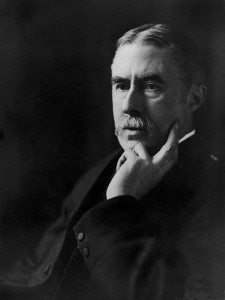I took an introductory Latin course in college (yes, I am a complete nerd), and was therefore able to recognize the grammar of the phrase “Parta Quies,” an A.E. Housman poem, when I saw it; however, I wasn’t exactly sure what it meant. A quick entry into Google Translate (and several other searches, to check for accuracy) revealed that it means, roughly, “rest is won.” My Internet searching also led me to discover that this is a phrase from a work by Virgil, which didn’t surprise me in the least. The phrase isn’t a surprising choice for the poem’s title either. It sums up the overall message of the poem perfectly. The piece is about getting to enjoy eternal peace after death:
Good-night; ensured release,
Imperishable peace,
Have these for yours,
While sea abides, and land,
And earth’s foundations stand,
And heaven endures.
When earth’s foundations flee,
Nor sky nor land nor sea
At all is found,
Content you, let them burn:
It is not your concern;
Sleep on, sleep sound.
Housman immediately sets the poem up as being about a kind of soothing sleep by opening with “Good-night” (1). The adjectives that follow confirm the comfort of death: the “release” (1) is “ensured” (1), and it comes with “peace” (2) that is “imperishable” (2). The narrator speaks as though he is reassuring someone who has died, especially when he says “have these for yours” (3) and “content you, let them burn” (10). He is gently telling his audience to give in to death, to be relieved by it. Those that die never have to worry about anything ever again, whether times are good or bad, and this is the point that the narrator is trying to drive home.
The first verse advises that the addressee relish the tranquility of death as the earth continues to turn. Even though the world hasn’t stopped, the people that have passed on have no problems, no stress. At this point in the poem, the times are relatively untroubled: the “sea abides” (4), “earth’s foundations stand” (5), and “heaven endures” (6), but the next verse describes the deterioration of the planet.
Thus, Housman illustrates his point even more clearly in the second stanza. Even if the earth falls apart, if its “foundations flee” (7) and “sky” (8), “land” (8), and “sea” (8) are nowhere to be found, it doesn’t matter to those that have died. As Housman puts it, “it is not your concern” (11). They are free from worrying about it, free from all earthly concerns, in fact. They are able to simply “sleep on, sleep sound” (12). After years of hard work in an often challenging world, our “rest is won,” just as the title says.
Related Reading:
- “The Serene Sleep” (SevenPonds)
- A biography of A.E. Housman

 “Parta Quies” by A.E. Housman
“Parta Quies” by A.E. Housman




 “Hand to Earth” by Andy Goldsworthy
“Hand to Earth” by Andy Goldsworthy
 Trans Remembrance Project Provides a Community of Grieving
Trans Remembrance Project Provides a Community of Grieving
 Caring for a Dying Loved One? Be Gentle With Yourself.
Caring for a Dying Loved One? Be Gentle With Yourself.














